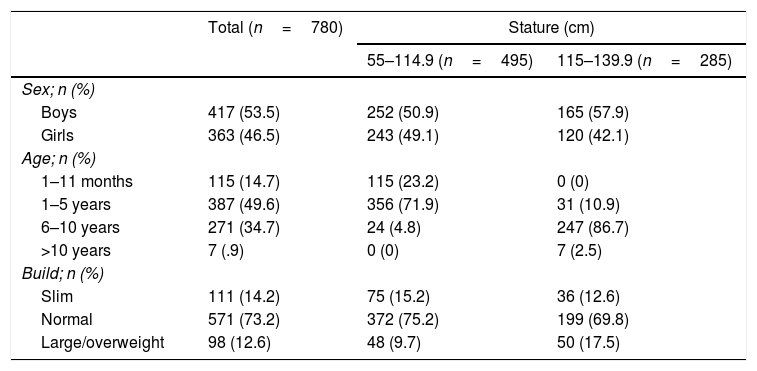To develop and validate a weight estimation tool applicable in paediatric emergency care.
MethodsUsing anthropometric data from a computerized database of the primary health care paediatric services, Bilbao (Basque Country, Spain), linear regression models were developed with the objective of estimating weight from height. Subsequently, these models were prospectively validated using a consecutive sample of children attended in the emergency department of two tertiary hospitals. Estimated weights were compared with actual weights, calculating the intraclass correlation coefficient (ICC), mean difference and percentages of estimations falling within 10% and 20% of the actual weight.
ResultsUsing anthropometric data from 15,522 children two weight predictive formulas were developed (Bilbao Formulas). The formulas were validated on a sample of 780 children and estimated weight values with a high degree of intraclass correlation with the real weight (ICC=.93, p<.001) and a mean difference of .63 (SD: 4.3). The percentages of estimations falling within 10% and 20% of the actual weight of the child was 62.2% (95% CI: 58.7–65.6) and 93.1% (95% CI: 91.1–94.8), respectively. Weight estimations were more accurate using Bilbao Formulas than other classical formulas.
ConclusionsBilbao Formulas would be a valid tool for estimating weight in children in the emergency department and predict weight more accurately than other more commonly used age-based formulas.
Desarrollar y validar una herramienta de estimación del peso en emergencias pediátricas.
MétodoEstudio realizado en 2 etapas. Utilizando datos antropométricos informatizados de los servicios de pediatría de atención primaria de Bilbao (País Vasco, España) se elaboraron modelos de regresión lineal para estimar el peso en función de la estatura. Posteriormente, estos modelos fueron aplicados de forma prospectiva a una muestra consecutiva de pacientes pediátricos atendidos en urgencias de 2 hospitales terciarios. Se compararon los pesos estimados con los reales, calculando el coeficiente de correlación intraclase (CCI), media de la diferencia y proporción de mediciones con un error del peso estimado inferior al 10 y 20% con respecto al valour real.
ResultadosA partir de los datos antropométricos de 15.522 menores se desarrollaron 2 fórmulas predictivas del peso (“fórmulas de Bilbao”). Las formulas fueron validadas sobre una muestra de 780 pacientes pediátricos, y estimaron valores del peso con un alto grado de correlación intraclase con respecto al peso real (CCI=0,93; p<0,001) y una media de la diferencia de 0,63 (DE: 4,3). La proporción de error de la estimación del peso con respecto al valour real fue inferior al 10 en el 62,2% (IC 95%: 58,7-65,6) de las mediciones e inferior al 20% en el 93,1% (IC 95%: 91,1-94,8), unos resultados notablemente mejores que los que hubiesen obtenido otras fórmulas clásicas.
ConclusionesLas “fórmulas de Bilbao” pueden suponer una herramienta válida en la estimación del peso en pacientes pediátricos en urgencias y predicen el peso con mayor precisión que otras fórmulas de uso más habitual basadas en la edad.











